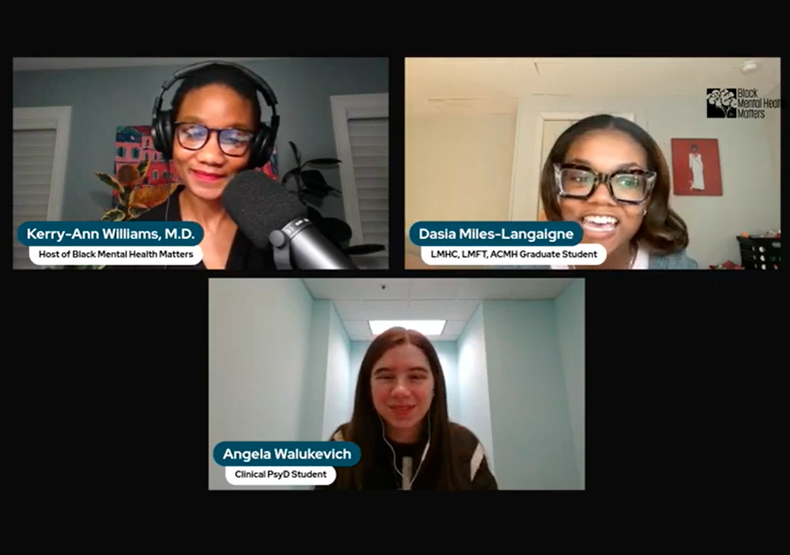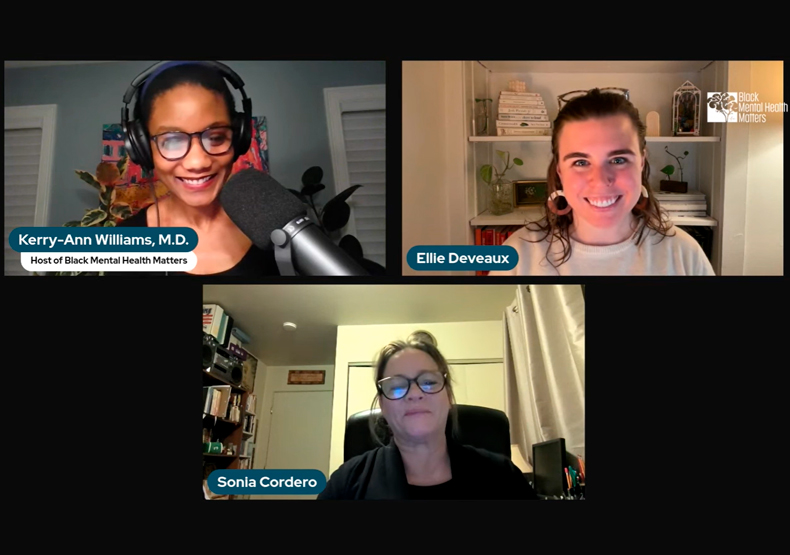Black Mental Health Matters Podcast with Dr. Kerry-Ann

Community Resources for Teens with Angela Walukevich and Dasia Miles-Langaigne
Two William James College students, Dasia Miles-Langaigne and Angela Walukevich, recently participated in the Black Mental Health Matters podcast hosted by Dr. Kerry Ann Williams.
Dasia and Angela took a class on Mental Health Disparities: Multicultural and Global Perspectives in Fall 2024, taught by Dr. Shani Turner who is the Director of the African and Caribbean Mental Health concentration at William James College. As part of their work, they completed a project focused on community resources for teenagers: why they are important and how COVID-19 impacted the growth and development of teens.
Dasia is a second-year student in the MA in Clinical Mental Health Counseling program with a dual concentration in Couples and Family Therapy and African and Caribbean Mental Health. She also completed the William James College Behavioral Health Service Corps in 2019. She plans to use her training and lived experience to help black women.
Angela Walukevich is a fourth-year student in the PsyD in Clinical Psychology program. Following graduation, she wants to work with populations across the lifespan including individuals, children and families.
Dr. Kerry Ann Williams is a psychiatrist in Massachusetts working with children, teenagers, and adults. In March 2020, she created a talk show dedicated to all things mental health in the black community. Black Mental Health Matters with Dr. Kerry Ann started as a radio show, then became an online talk show, and now is a podcast, which features discussions on overall wellness, community resources and personal experiences. William James College is grateful to Dr. Kerry-Ann for having these important conversations and inviting our William James College students to the podcast.
Below is a recap of the conversation. We encourage you to listen to the podcast to learn more. Listen here: Community Resources for Teens with Angela Walukevich and Dasia Miles-Langaigne
Why are community resources for teenagers important?
Community resources aid in supporting not only the teens but their family as well. These resources can be a positive influence in a teenager’s life. Beyond enjoying the experience, programs can assist with a teenager’s development including social, educational, and physical growth. Research shows the benefit of participation in outreach programs includes improvements in emotions and attitudes, self perception, school performance, and behavior. Angela shared that one community program (Youth, Purpose, & Partnership through Children’s Services of Roxbury) indicated that adolescents acquire skills, credentialing and exposure and experience with technology and work based learning. These positive experiences can impact self regulation, building resilience, and strengthen relationships. Not only can these skills help to secure a teen’s future in college or career, but they can also prepare them for a fulfilling life.
Is it easy to find a resource? Are there any barriers?
Parents and caregivers often face challenges in researching child care programs due to limited time, inflexible work schedules, and the need to balance other responsibilities like managing finances and transportation. These factors make navigating child care decisions one of many demanding aspects of parenting.
In the Boston area, there are many resources available to teenagers and their families, including vouchers for transportation and activities. Boston After School and Beyond is a resource hub for after school activities and summer programs for Boston residents.
Parents and caregivers can also find information at their local library. Community organizations are encouraged to use ‘teen to teen’ outreach to get the word out about programs, as well as using community partners to help spread the word. While one program may not suit a particular teen, it could be a perfect match for another.
What are some of the mental health challenges that teenagers are facing?
In Dasia’s experience working at a college, COVID-19 has been identified as a significant event for teens, serving as a catalyst for anxiety and depression. Social anxiety, in particular, has become a barrier, preventing many young people from participating in community programs due to overwhelming nervousness. Beyond social anxiety, other mental health challenges have emerged, including OCD, grief, loneliness, distress, anger, irritability, boredom, difficulties with stress management, ADHD, ADD, disordered eating, eating disorders, and sleep disturbances. These issues highlight the pandemic’s far-reaching impact on the emotional and psychological well-being of teens.
What can we do to help support teens?
We can encourage teenagers to build routines to help navigate stress and make time for community engagement.
Community organizations can assist by providing programming geared towards what teens need and want. It’s important to make sure programs are designed for teens and not what we think they need/want to hear or learn.
An important recommendation is to keep it simple and include play or a creative outlet. Dasia shared that she recently ran a program on rock painting, and the students loved it.
Is there a list of Resources?
Please visit Dr. Kerry Ann Williams podcast description for a list of resources and links.
How to Hear More from Dr. Kerry Ann and our William James College Students
Four years ago, the Center for Multicultural & Global Mental Health (CMGMH)'s Black Mental Health Graduate Academy, led by Dr. Natalie Cort, partnered with Dr. Kerry Ann Williams (Justice Resource Institute), who through her podcast: Black Mental Health Matter's, has now provided more than 23 CMGMH students (e.g., Edsel Cadet, Alyssa Cetoute, Xinru Wang, Sonia Cordero, Eleanor Deveaux) and faculty (e.g., Dr. Natalie Cort, Dr. Shani Turner, Dr. Brandi Derr) with professionally enriching opportunities to increase awareness of mental health disparities impacting underserved communities. Dr. Shani Turner, who teaches the CMGMH's Mental Health Disparities course, now stewards all of our students in the Latino Mental Health (Dr. Mari Bennasar), Asian Mental Health (Dr. Catherine Vuky), African & Caribbean Mental Health (Dr. Shani Turner), and Global Mental Health (Dr. Jill Bloom) concentrations through the "Beyond the Classroom" assignment in which students learn to develop their professional voice and creatively educate the public about inequities burdening the lives of many marginalized communities through workshops and BMMM podcast appearances. Please be sure to check out Dr. Williams' Black Mental Health Matter's websites: Black Mental Health Matters with Dr. Kerry- Ann and Dr. Kerry Ann's website.
Another recent podcast episode, Disparities in Neuropsych Assessments, features two graduate students from William James College - Ellie Deveaux, 4th year Clinical Psychology PsyD student and Sonia Cordero, 2nd year Clinical Psychology PsyD student, to discuss cultural disparities in neuropsychological assessments and provide resources for accessing these assessments in the Boston area.
Listen Here! Podcast: Disparities in Neuropsych Assessments with Sonia Cordero and Ellie Deveaux

- Tags:
- Research & Advocacy
Topics/Tags
Follow William James College
Media Contact
- Katie O'Hare
- Senior Director of Marketing
- katie_ohare@williamjames.edu
- 617-564-9389
